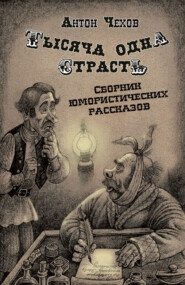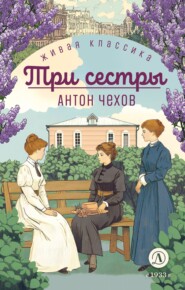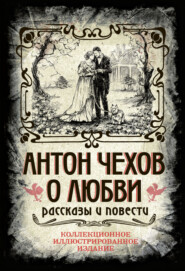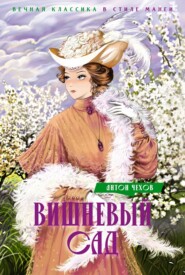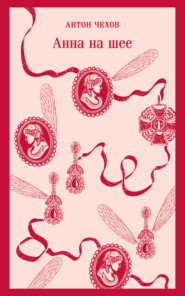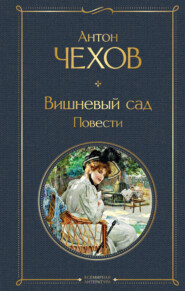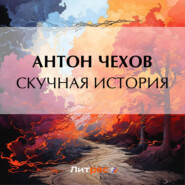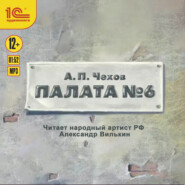По всем вопросам обращайтесь на: info@litportal.ru
(©) 2003-2025.
✖
The Schoolmistress, and Other Stories
Настройки чтения
Размер шрифта
Высота строк
Поля
Getting no answer, he stood for a minute, pondered, and answered himself in Little Russian: “Nay. The confounded fellow has gone to the University.”
And he went away. Vassilyev lay down on the bed and, thrusting his head under the pillow, began crying with agony, and the more freely his tears flowed the more terrible his mental anguish became. As it began to get dark, he thought of the agonizing night awaiting him, and was overcome by a horrible despair. He dressed quickly, ran out of his room, and, leaving his door wide open, for no object or reason, went out into the street. Without asking himself where he should go, he walked quickly along Sadovoy Street.
Snow was falling as heavily as the day before; it was thawing. Thrusting his hands into his sleeves, shuddering and frightened at the noises, at the trambells, and at the passers-by, Vassilyev walked along Sadovoy Street as far as Suharev Tower; then to the Red Gate; from there he turned off to Basmannya Street. He went into a tavern and drank off a big glass of vodka, but that did not make him feel better. When he reached Razgulya he turned to the right, and strode along side streets in which he had never been before in his life. He reached the old bridge by which the Yauza runs gurgling, and from which one can see long rows of lights in the windows of the Red Barracks. To distract his spiritual anguish by some new sensation or some other pain, Vassilyev, not knowing what to do, crying and shuddering, undid his greatcoat and jacket and exposed his bare chest to the wet snow and the wind. But that did not lessen his suffering either. Then he bent down over the rail of the bridge and looked down into the black, yeasty Yauza, and he longed to plunge down head foremost; not from loathing for life, not for the sake of suicide, but in order to bruise himself at least, and by one pain to ease the other. But the black water, the darkness, the deserted banks covered with snow were terrifying. He shivered and walked on. He walked up and down by the Red Barracks, then turned back and went down to a copse, from the copse back to the bridge again.
“No, home, home!” he thought. “At home I believe it’s better…”
And he went back. When he reached home he pulled off his wet coat and cap, began pacing round the room, and went on pacing round and round without stopping till morning.
VII
When next morning the artist and the medical student went in to him, he was moving about the room with his shirt torn, biting his hands and moaning with pain.
“For God’s sake!” he sobbed when he saw his friends, “take me where you please, do what you can; but for God’s sake, save me quickly! I shall kill myself!”
The artist turned pale and was helpless. The medical student, too, almost shed tears, but considering that doctors ought to be cool and composed in every emergency said coldly:
“It’s a nervous breakdown. But it’s nothing. Let us go at once to the doctor.”
“Wherever you like, only for God’s sake, make haste!”
“Don’t excite yourself. You must try and control yourself.”
The artist and the medical student with trembling hands put Vassilyev’s coat and hat on and led him out into the street.
“Mihail Sergeyitch has been wanting to make your acquaintance for a long time,” the medical student said on the way. “He is a very nice man and thoroughly good at his work. He took his degree in 1882, and he has an immense practice already. He treats students as though he were one himself.”
“Make haste, make haste!..” Vassilyev urged.
Mihail Sergeyitch, a stout, fair-haired doctor, received the friends with politeness and frigid dignity, and smiled only on one side of his face.
“Rybnikov and Mayer have spoken to me of your illness already,” he said. “Very glad to be of service to you. Well? Sit down, I beg…”
He made Vassilyev sit down in a big armchair near the table, and moved a box of cigarettes towards him.
“Now then!” he began, stroking his knees. “Let us get to work… How old are you?”
He asked questions and the medical student answered them. He asked whether Vassilyev’s father had suffered from certain special diseases, whether he drank to excess, whether he were remarkable for cruelty or any peculiarities. He made similar inquiries about his grandfather, mother, sisters, and brothers. On learning that his mother had a beautiful voice and sometimes acted on the stage, he grew more animated at once, and asked:
“Excuse me, but don’t you remember, perhaps, your mother had a passion for the stage?”
Twenty minutes passed. Vassilyev was annoyed by the way the doctor kept stroking his knees and talking of the same thing.
“So far as I understand your questions, doctor,” he said, “you want to know whether my illness is hereditary or not. It is not.”
The doctor proceeded to ask Vassilyev whether he had had any secret vices as a boy, or had received injuries to his head; whether he had had any aberrations, any peculiarities, or exceptional propensities. Half the questions usually asked by doctors of their patients can be left unanswered without the slightest ill effect on the health, but Mihail Sergeyitch, the medical student, and the artist all looked as though if Vassilyev failed to answer one question all would be lost. As he received answers, the doctor for some reason noted them down on a slip of paper. On learning that Vassilyev had taken his degree in natural science, and was now studying law, the doctor pondered.
“He wrote a first-rate piece of original work last year…” said the medical student.
“I beg your pardon, but don’t interrupt me; you prevent me from concentrating,” said the doctor, and he smiled on one side of his face. “Though, of course, that does enter into the diagnosis. Intense intellectual work, nervous exhaustion… Yes, yes… And do you drink vodka?” he said, addressing Vassilyev.
“Very rarely.”
Another twenty minutes passed. The medical student began telling the doctor in a low voice his opinion as to the immediate cause of the attack, and described how the day before yesterday the artist, Vassilyev, and he had visited S. Street.
The indifferent, reserved, and frigid tone in which his friends and the doctor spoke of the women and that miserable street struck Vassilyev as strange in the extreme…
“Doctor, tell me one thing only,” he said, controlling himself so as not to speak rudely. “Is prostitution an evil or not?”
“My dear fellow, who disputes it?” said the doctor, with an expression that suggested that he had settled all such questions for himself long ago. “Who disputes it?”
“You are a mental doctor, aren’t you?” Vassilyev asked curtly.
“Yes, a mental doctor.”
“Perhaps all of you are right!” said Vassilyev, getting up and beginning to walk from one end of the room to the other. “Perhaps! But it all seems marvelous to me! That I should have taken my degree in two faculties you look upon as a great achievement; because I have written a work which in three years will be thrown aside and forgotten, I am praised up to the skies; but because I cannot speak of fallen women as unconcernedly as of these chairs, I am being examined by a doctor, I am called mad, I am pitied!”
Vassilyev for some reason felt all at once unutterably sorry for himself, and his companions, and all the people he had seen two days before, and for the doctor; he burst into tears and sank into a chair.
His friends looked inquiringly at the doctor. The latter, with the air of completely comprehending the tears and the despair, of feeling himself a specialist in that line, went up to Vassilyev and, without a word, gave him some medicine to drink; and then, when he was calmer, undressed him and began to investigate the degree of sensibility of the skin, the reflex action of the knees, and so on.
And Vassilyev felt easier. When he came out from the doctor’s he was beginning to feel ashamed; the rattle of the carriages no longer irritated him, and the load at his heart grew lighter and lighter as though it were melting away. He had two prescriptions in his hand: one was for bromide, one was for morphia… He had taken all these remedies before.
In the street he stood still and, saying good-by to his friends, dragged himself languidly to the University.
MISERY
“To whom shall I tell my grief?”
THE twilight of evening. Big flakes of wet snow are whirling lazily about the street lamps, which have just been lighted, and lying in a thin soft layer on roofs, horses’ backs, shoulders, caps. Iona Potapov, the sledge-driver, is all white like a ghost. He sits on the box without stirring, bent as double as the living body can be bent. If a regular snowdrift fell on him it seems as though even then he would not think it necessary to shake it off… His little mare is white and motionless too. Her stillness, the angularity of her lines, and the stick-like straightness of her legs make her look like a halfpenny gingerbread horse. She is probably lost in thought. Anyone who has been torn away from the plough, from the familiar gray landscapes, and cast into this slough, full of monstrous lights, of unceasing uproar and hurrying people, is bound to think.
It is a long time since Iona and his nag have budged. They came out of the yard before dinnertime and not a single fare yet. But now the shades of evening are falling on the town. The pale light of the street lamps changes to a vivid color, and the bustle of the street grows noisier.
“Sledge to Vyborgskaya!” Iona hears. “Sledge!”
Iona starts, and through his snow-plastered eyelashes sees an officer in a military overcoat with a hood over his head.
“To Vyborgskaya,” repeats the officer. “Are you asleep? To Vyborgskaya!”
In token of assent Iona gives a tug at the reins which sends cakes of snow flying from the horse’s back and shoulders. The officer gets into the sledge. The sledge-driver clicks to the horse, cranes his neck like a swan, rises in his seat, and more from habit than necessity brandishes his whip. The mare cranes her neck, too, crooks her stick-like legs, and hesitatingly sets of…
“Where are you shoving, you devil?” Iona immediately hears shouts from the dark mass shifting to and fro before him. “Where the devil are you going? Keep to the r-right!”
“You don’t know how to drive! Keep to the right,” says the officer angrily.
A coachman driving a carriage swears at him; a pedestrian crossing the road and brushing the horse’s nose with his shoulder looks at him angrily and shakes the snow off his sleeve. Iona fidgets on the box as though he were sitting on thorns, jerks his elbows, and turns his eyes about like one possessed as though he did not know where he was or why he was there.
“What rascals they all are!” says the officer jocosely. “They are simply doing their best to run up against you or fall under the horse’s feet. They must be doing it on purpose.”






